 5/9/2014 - AHF Submits Letter to Secretary of State John Kerry expressing concern that the US Embassy's public (as opposed to private) statement about Hungary's history concerning the treacherous year of 1944 may have the unintended consequence of alienating Hungarians at a time when NATO needs to be unified and resolute in confronting the challenges posed by Ukraine and Russia. The letter appears in full below and available for [download] 5/9/2014 - AHF Submits Letter to Secretary of State John Kerry expressing concern that the US Embassy's public (as opposed to private) statement about Hungary's history concerning the treacherous year of 1944 may have the unintended consequence of alienating Hungarians at a time when NATO needs to be unified and resolute in confronting the challenges posed by Ukraine and Russia. The letter appears in full below and available for [download]
|
AHF Submits Letter to Secretary of State John Kerry. [download] |
May 6, 2014
Dear Secretary Kerry:
The American Hungarian Federation (the “Federation”), founded over 100 years ago, represents a broad cross-section of the Hungarian American community. It is a staunch supporter of good American/Hungarian relations, democracy, human and minority rights and stability in Central and Eastern Europe. We write in connection with seemingly disparate but actually intersecting events relating to the foregoing issues.
The dangerous developments rapidly unfolding in Ukraine affect the security interests of both the countries of the region and the United States. The members of NATO must be united and resolute if they are to effectively confront the challenges posed by Ukraine and Russia. We applaud your efforts in this regard.
Hungary has been a strong NATO ally. At the same time it has been the object of relentless, and in many instances unjustifiably harsh, criticism asserting that Hungary is anti-democratic and an incorrigible violator of human rights. This in spite of the fact that the governing party has twice won a two-thirds majority in elections internationally recognized as free -- an extraordinary feat for any democracy.
While much of the criticism has emerged from quarters that are prejudiced against the Hungarian government, it nevertheless has regrettably also found its way into official public pronouncements. The criticism even extends to topics that are generally in the purview of matters left to internal discourse of sovereign states, e.g., historical events and figures.
The April 22 statement issued by the U.S. Embassy in Budapest relating to the memorial to the “victims of the German occupation of Hungary” in 1944 squarely falls into this latter category.
Without here expressing an opinion relative to the memorial itself, the Federation would note that the history of Hungary and the consequences of the occupation in that treacherous and dark year when hundreds of thousands of Hungarian Jews perished at the hands of the German occupiers and their Hungarian collaborators are much debated topics in Hungary this year as Hungarians remember the 70th anniversary of the horrors of the Hungarian Holocaust.
Diplomatic etiquette usually requires that issues relating to a host country’s history be raised in private, not publicly in a patronizing manner. By publicly injecting itself into Hungary’s debate concerning the history of 1944, the April 22 statement serves only to humiliate and alienate many Hungarians who support NATO and its now critical mission. This, in turn, could have the unintended consequence of undermining U.S. strategic interests. Indeed, we Americans would understandably bristle if a foreign government publicly lectured us about, for instance, how we should commemorate the events relating to the U.S. Civil War and slavery.
Therefore, we respectfully urge that greater sensitivity be shown toward Hungarians and that all necessary steps be taken to shore up the alliance and thereby promote U.S. interests in restoring the rule of international law in a region that is emerging to be dangerously volatile.
--------------------
AHF REMEMBERS THE HEROES OF THE HUNGARIAN HOLOCAUST
The Federation takes this opportunity to remember Carl Lutz, Raoul Wallenberg and other foreign<
diplomats as well as the Hungarian heroes who at great personal peril saved many Jewish lives.
The Hungarians include but, of course, are not limited to the following individuals:
- Janos Esterhazy opposed the Slovak Nazi puppet regime of Jozef Tiso. At great peril to himself, he was the only member of the Slovak Parliament to vote against the law authorizing the deportation of Jews in 1942. Later, Esterhazy personally saved Jews from the Holocaust.
- General Vilmos Nagybaczoni-Nagy who upon being appointed minister of defense by the Kallay
government took measures to end the gross abuse threatening the lives of Jews and others in
the auxiliary labor force;
- Tibor Baranszky who, as secretary to Monsignor Angelo Rotta, the Vatican’s ambassador to
Budapest, saved many lives by distributing protective letters to Jews on forced marches and
elsewhere;
- Roman Catholic Priest Ferenc Kallo who gave Jews life‐saving certificates of baptism and who was killed by the Arrow Cross on October 29, 1944;
- Jozsef Antall Senior, who as a member of the ministry of internal affairs for civilian refugees
gave refuge to and thereby saved Jews and Poles and who enjoyed the support and confidence
of Minister of Interior Ferenc Keresztes‐Fischer and Prime Ministers Pal Teleki and after his death Miklos Kallay.
- Prince-Primate Jusztinian Seredi, Bishop Laszlo Ravasz of the Reformed Church and Istvan Bethlen who communicated protests to Regent Horthy in 1944 against deportations following Nazi Germany’s occupation of Hungary; and
- Col. Ferenc Koszorus, posthumously promoted to the rank of General by Prime Minister Antall after the fall of Communism, who volunteered his services and mobilized the 1st Armored Division under his command to militarily intervene on July 5, 1944 to stop Laszlo Baky, a secretary of state in the Ministry of Interior for “Jewish Affairs," from deporting the approximately 200,000 plus Jews from Budapest.2
The Federation believes that the extraordinary courage, moral strength and fortitude of these and
other individuals who despite overwhelming odds were willing to confront evil and act on behalf
of humanity serve as examples for all of humankind; they must never be forgotten.
________________________________________
1 When Minister of Interior Ferenc Keresztes-Fischer learned the details of these actions, he ordered them to be stopped.
2 On the 50th anniversary of the Hungarian Holocaust, Congressman Tom Lantos (for whom one of the co-sponsoring
organizations is named) referred to Col. Koszorus as "A Hero of the Hungarian Holocaust" and stated that "[a]s a result of his extraordinarily brave efforts, taken at great risk in an extremely volatile situation, the eventual takeover of Budapest by the Nazis was delayed by 3 1/2 months. This hiatus allowed thousands of Jews to seek safety in Budapest, thus sparing them from certain
execution. It also permitted the famous Raoul Wallenberg, who arrived in Budapest on July 9, 1944, to coordinate his successful
and effective rescue mission." As is clear from Congressman Lantos’ remarks, had Col. Koszorus’ intervention not occurred,
Wallenberg would not have had many lives to save. Neither would have Lutz.
[<< Back to All AHF News]
|  “Whoever Saves a Life, it is Considered as if
He Saved an Entire World” “Whoever Saves a Life, it is Considered as if
He Saved an Entire World”
(Jerusalem Talmud)
Buy books related to the Holocaust and Col. Koszorus on AHF's Amazon Store 
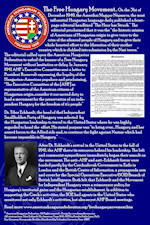 |
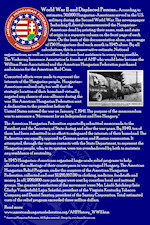 |
| AHF, Tibor Eckhardt, and
the "Free Hungary Movement"
seeking to extract Hungary
from the Axis sphere
[read more] |
AHF relief efforts during WWII [click for large image] |
Related Articles:
>> Go to AHF News on NATO
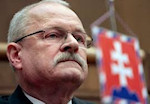 9/13/2011 - Slovak President shamefully calls Janos Esterhazy, a hero of the Holocaust, a follower of Hitler. AHF continues call for rehabilitation of Janos Esterhazy, reacts to Slovak falsification of history... Esterhazy was the only member of the Slovak Parliament in 1942 who voted against expelling the Jews, setting an example which few dared to follow in the parts of Europe controlled by Adolf Hitler's Germany. He was detained by the Nazis and died in a communist prison. He is still classified as a war criminal in Slovakia. [read more] 9/13/2011 - Slovak President shamefully calls Janos Esterhazy, a hero of the Holocaust, a follower of Hitler. AHF continues call for rehabilitation of Janos Esterhazy, reacts to Slovak falsification of history... Esterhazy was the only member of the Slovak Parliament in 1942 who voted against expelling the Jews, setting an example which few dared to follow in the parts of Europe controlled by Adolf Hitler's Germany. He was detained by the Nazis and died in a communist prison. He is still classified as a war criminal in Slovakia. [read more]
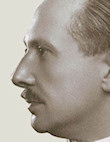 6/8/2011 - AHF honors Col. Ferenc Koszorus, Sr., reflects on Holocaust Memorial Month. AHF honors the millions of lives lost and the untold suffering caused by Nazism and Communism. But even during the horrors of WWII, stories of resistance to Nazi atrocities emerged. 6/8/2011 - AHF honors Col. Ferenc Koszorus, Sr., reflects on Holocaust Memorial Month. AHF honors the millions of lives lost and the untold suffering caused by Nazism and Communism. But even during the horrors of WWII, stories of resistance to Nazi atrocities emerged.
 Hungary, heavily influenced by her desire to regain lost territories and reunite Hungarians in the Carpathian Basin, had found support in Italy and Germany and joined the Axis, a tragic mistake. While the Jewish community in Hungary had reason
to hope that it would be spared the fate of other Jewish communities in the countries surrounding
Hungary and elsewhere, 1944 changed everything. Hungary, heavily influenced by her desire to regain lost territories and reunite Hungarians in the Carpathian Basin, had found support in Italy and Germany and joined the Axis, a tragic mistake. While the Jewish community in Hungary had reason
to hope that it would be spared the fate of other Jewish communities in the countries surrounding
Hungary and elsewhere, 1944 changed everything.
[read more]
 11/8/2011 - The Anti-Defamation League presented the Jan Karski Courage to Care Award to Count Janos Esterhazy. This comes just two months after the Slovak President shamefully calls this hero of the Holocaust a follower of Hitler. 11/8/2011 - The Anti-Defamation League presented the Jan Karski Courage to Care Award to Count Janos Esterhazy. This comes just two months after the Slovak President shamefully calls this hero of the Holocaust a follower of Hitler.  AHF continues to express concern over Slovakia's anti-Hungarian measures."Those who defended and aided Jews and other victims of the Nazislaughter merit our recognition and our eternal thanks. They were individuals who followed the call to conscience, which is surely no simple matter... Count János Esterházy was such a person of conscience, one who had more than enough reason to remain silent." [read more] AHF continues to express concern over Slovakia's anti-Hungarian measures."Those who defended and aided Jews and other victims of the Nazislaughter merit our recognition and our eternal thanks. They were individuals who followed the call to conscience, which is surely no simple matter... Count János Esterházy was such a person of conscience, one who had more than enough reason to remain silent." [read more]
 6/8/2012 - Hungarian Review publishes article, "The Soldier Who Saved the Lives of Budapest's Jews: Col. Ferenc Koszorus." The courageous intervention of Col. Ferenc Koszorus and his loyal First Armored Division on July 6, 1944 blocked the deportation of the more than 250,000 Jews of Budapest. In paying tribute to Col. Koszorus, former Congressman Tom Lantos, a survivor of the Holocaust, noted that the Koszorus intervention "permitted... Wallenberg, who arrived in Budapest on July 9, 1944, to coordinate his successful and effective rescue mission." 6/8/2012 - Hungarian Review publishes article, "The Soldier Who Saved the Lives of Budapest's Jews: Col. Ferenc Koszorus." The courageous intervention of Col. Ferenc Koszorus and his loyal First Armored Division on July 6, 1944 blocked the deportation of the more than 250,000 Jews of Budapest. In paying tribute to Col. Koszorus, former Congressman Tom Lantos, a survivor of the Holocaust, noted that the Koszorus intervention "permitted... Wallenberg, who arrived in Budapest on July 9, 1944, to coordinate his successful and effective rescue mission."
[read more]
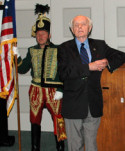 Congressional Record Congressional Record
FERENC KOSZORUS: A HERO OF THE HUNGARIAN HOLOCAUST
HON. TOM LANTOS
(Extension of Remarks - May 26, 1994)
[Page: E1109]
HON. TOM LANTOS
in the House of Representatives
THURSDAY, MAY 26, 1994
(Tom Lantos, who died in February 2008 of esophageal cancer, was honored with the Presidential Medal of Freedom, the nation's highest civilian honor. He was also recipient of AHF's highest honor, the Col. Commandant Michael Kovats Medal of Freedom [read more])
- Mr. LANTOS. Mr. Speaker, this year marks the 50th anniversary of the Hungarian holocaust. I rise today to recognize one of the great heros of the Hungarian holocaust. Ferenc Koszorus, who at great personal sacrifice to his own life, saved thousands of Hungarian Jews from deportation to Nazi death camps.
- During the turbulent time in the summer of 1944, advancing Allied forces were closing in on Berlin while Hitler was racing to implement the final solution, the destruction of the Jewish race. There were many acts of heroic compassion and humanitarianism during this period. I would like to recount the story of Col. Ferenc Koszorus, one of the most remarkable examples of bravery and courage of the time.
- By June 1944, the Nazis had incarcerated and liquidated most of the Jewish population of Europe. In the capital of Hungary, Budapest, there remained approximately 250,000 Jews still alive. Budapest was still under control of the Hungarian police force. The Nazis believed that this force was not ruthless and brutal enough to deal adequately with the complete destruction of the large remaining Jewish population of Budapest.
- Ferenc Koszorus was a colonel in the Hungarian Army in charge of the First Magyar Armored Division stationed in and around Budapest. He learned that Laszlo Baky, Secretary of State and director of all security forces, with the exception of the army, had planned a coup d'etat to install a police force completely subservient to the Nazis. They would see to it that Hungary was purged of all remaining Jews.
- With the help of the Gestapo, Baky formed several battalions of `gendarmerie' forces loyal to him. Orders from the Regent to disband the gendarmerie went unheeded. Colonel Koszorus controlled the last remaining active army unit in Hungary. At a time when few others would stand up to the Nazi occupation, Colonel Koszorus took the initiative to resist.
- Realizing the severity of the situation, Colonel Koszorus consulted with the Regent and began preparations on his own to stop Baky and the gendarmerie battalions. On July 5, 1944 at 11:30 p.m., Colonel Koszorus ordered the units of the 1st Armored Division to take up positions at strategic points in Budapest, sealing off all road leading into the city. By 7:00 a.m. on July 6, 1944 all the units were in place and Colonel Koszorus informed Baky that if his gendarmerie did not leave and disband they would be destroyed. On July 7, 1944 Baky capitulated and evacuated his forces.
- Colonel Koszorus' unparalleled action was the only case known in which an Axis power used military force for the purpose of preventing the deportation of the Jews. As a result of his extraordinarily brave efforts, taken at great risk in an extremely volatile situation, the eventual takeover of Budapest by the Nazis was delayed by 3 1/2 months. This hiatus allowed thousands of Jews to seek safety in Budapest, thus sparing them from certain execution. It also permitted the famous Raoul Wallenberg, who arrived in Budapest on July 9, 1994, to coordinate his successful and effective rescue mission
- In October 1944, after the Germans had taken Budapest, Colonel Koszorus was forced into hiding to avoid certain execution by the Gestapo. While alive, Colonel Koszorus never received recognition of his actions. In 1991, Ferenc Koszorus was posthumously promoted to the rank of general by the Hungarian Government. His memory is honored with a plaque placed in the famous Dohany Street Synagogue in Budapest.
- Therefore it is with great honor and pride that I rise today in recognition valiant, patriotic efforts of Ferenc Koszorus. Many thousands of families are alive today as a result of the heroic actions of one man who stood up for his beliefs in a very uncertain and dangerous time. His loyalty to his country and love of humanity are an inspiration to all who struggle against oppression and the vile bigotry of racism.
- Too often the efforts of those who struggle against the Nazi oppression go unrecognized. This year, the 50th anniversary of Hungarian holocaust, the world reflects on the lessons learned. I am proud to honor Colonel Koszorus, a patriot, a humanitarian, and a hero.
[< back to all AHF news]
Join online!

|




 5/9/2014 - AHF Submits Letter to Secretary of State John Kerry expressing concern that the US Embassy's public (as opposed to private) statement about Hungary's history concerning the treacherous year of 1944 may have the unintended consequence of alienating Hungarians at a time when NATO needs to be unified and resolute in confronting the challenges posed by Ukraine and Russia. The letter appears in full below and available for [download]
5/9/2014 - AHF Submits Letter to Secretary of State John Kerry expressing concern that the US Embassy's public (as opposed to private) statement about Hungary's history concerning the treacherous year of 1944 may have the unintended consequence of alienating Hungarians at a time when NATO needs to be unified and resolute in confronting the challenges posed by Ukraine and Russia. The letter appears in full below and available for [download]